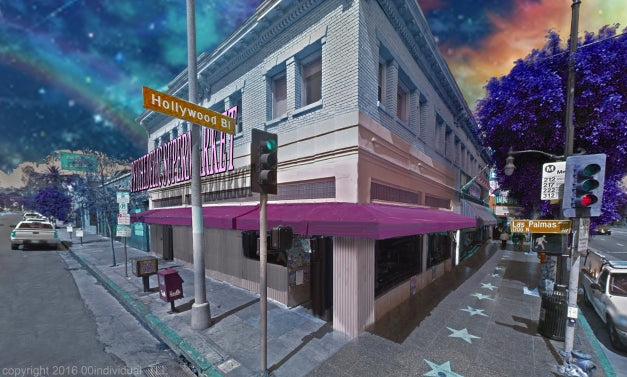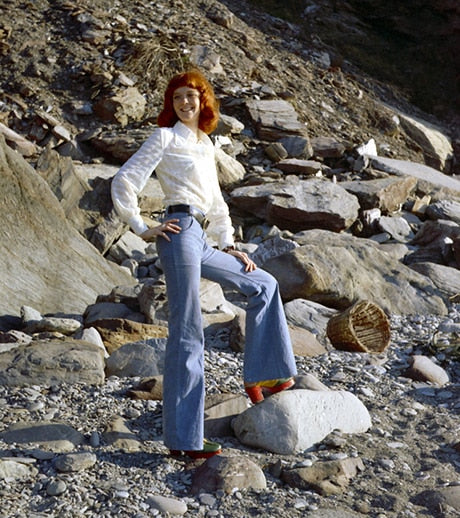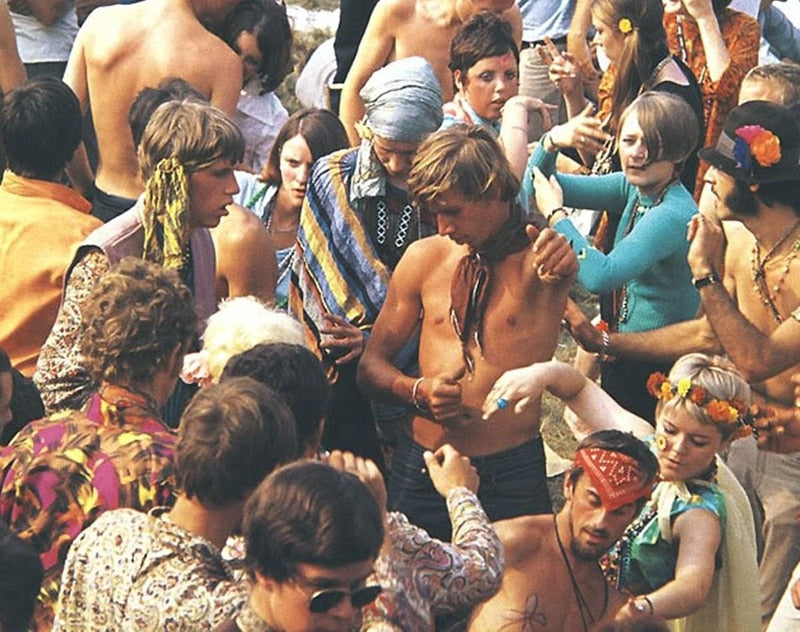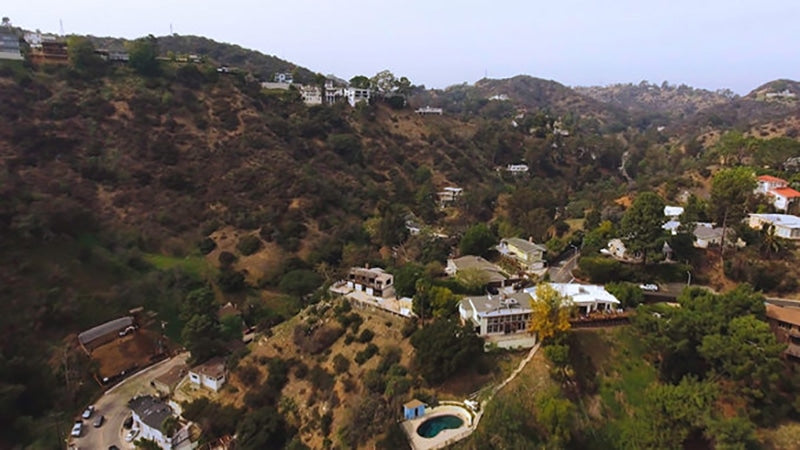In issue 141, Issue 142 and Issue 143 Ken wrote about his late 1960s relocation from New York to California. The story continues here.
At this point I was over it. I was getting bored working at the Music Revolution record store. I had been there for about five months and the thrill was gone. Still, it was a job, an easy one at that, and Les, the owner, was not abusive, nor did I have any other significant complaints. The pay wasn’t much but it was what you would expect that kind of retail work to pay.
At the Music Revolution I met Lenny, a guy from Brooklyn. He mentioned there was an opportunity to have my own business. There was this headshop called The Gemini Psychedelic Supermarket on Las Palmas just north of Hollywood Blvd. smack dab in the middle of Hollywood’s tourist area. The clothing concession was available. I was semi-interested. He mentioned that he had the poster concession and was doing very well.
Still, I wasn’t convinced, and I told him that I would think about it. I kind of forgot about it and Lenny showed up at the Music Revolution a week later. He said, “It is a good situation. There is no buy in, and this is a good opportunity for you to have your own business and make some money.” I had questions: there was no lease, and they could raise my rent at any time. If I was doing well, they could even evict me and take over my business. Lenny said those concerns were not an issue; he had done business with them, and their interest was in collecting the rent.
Two brothers, Mel and Gary, had the lease on the building and in turn rented space to the individual concession booths. They had product categories, and they decided what kind of merchandise each store could sell. Their idea was to guarantee that there was no competition within the Supermarket, and also to have control over what was sold. The reason was they wanted to maintain the integrity of the space and keep it “psychedelic” and hip…er, hippie.
The Psychedelic Supermarket was a pretty big space. I met with Mel and Gary in their office there. They seemed greasy and did not inspire confidence or trust. It would be an understatement to say they were an unusual-looking pair. Mel was in his late thirties and a little bit chubby with a permanent five o’clock shadow, a mustache with stringy dark brown hair. Mediterranean Sephardic, North African type.
 The Psychedelic Supermarket. Artwork by and courtesy of 00INDIVIDUAL.
The Psychedelic Supermarket. Artwork by and courtesy of 00INDIVIDUAL.
The other brother, Gary, had contracted polio when he was younger and was totally paralyzed from the waist down and wearing leg braces. For someone who was paralyzed Gary was quite mobile and self-sufficient. He got around on crutches and was unbelievably agile. He could stand and lean on his crutches for long spells, moved at a good clip and could get out of a chair by himself. I never saw Gary need help in any physical way. These brothers worked well together, though Mel seemed to be more of the leader of the two. These were not the type of people one would associate with the word “psychedelic.” They showed me around and explained the setup. We went back to their office, and they confirmed what Lenny told me about selling in my booth. “I don’t have any inventory,” I said, and Mel replied, “we have enough here to get you started,” and he showed me some women’s wear and men’s bell bottoms. I asked Mel where he got these clothes, and he told me a road salesman for a clothing manufacturer had quit his job and sold Mel his samples. I checked the samples out and they were pretty nice, good stuff. The prices were not that great but there was enough room to keystone them [keystone means doubling the price]. Then he brought up the rent, and it was $100 a week, to be paid every two weeks. I thought that was a bit high, but Mel said I would have no trouble making that and that this location was perfect and the foot traffic was good. I could run my business any way I wanted as long as it was clothing, and that I would be open the same hours as the venue hours. Based on Lenny’s recommendation and Mel and Gary’s promises, I agreed to take over a week from the following Monday.
I gave Les my notice while explaining where I was going and why. He understood, not really happy with having to replace me but nothing personal. I finished out my time at the Music Revolution and got ready to become a retail clothing store entrepreneur. I settled into the Psychedelic Supermarket. It was becoming one of the places in Hollywood to check out. Freaks were always wandering in and it was becoming a tourist stop too. In fact, several different tour buses would stop by each afternoon with tourists. Lenny’s posters were displayed all over the store, even the ceiling. He did a brisk business, selling hundreds of posters daily. He had the most successful booth and I wondered what his rent was. Then there was Michael Foster’s head shop that stocked everything from rolling papers to pipes and bongs and roach clips. A full-service paraphernalia shop. There were three other associated booths. The brothers were on site all the time and they were a pain in the ass. About a month after I started there, Les walked in. He said a friendly hello and then asked me some casual questions about the place. He walked around, checking everything out. I figured he did not just walk in by accident. He obviously had heard a buzz or something about the place and was checking out the concept, and now that I thought about it, that was astute. The place was becoming a mecca of sorts and attracted young freaks. Mel and Gary had a broken-in rustic older house that was in need of some repair up in the hills. They started inviting some freaks and hippies up after hours to hang out and party. I had no desire to join them, and had not gone before, but on one night, there was this girl. She was very cute, and we were hitting it off and she was wanting to go to the party. I decided to go with her to get to know her better. There were about twelve of us hanging out in this smallish rundown living room. We were talking and it was getting noisy, so she suggested that we go to the quieter guest room. Getting comfy, we continued to get to know each other. Afterward, we were taking a breather and I noticed a light coming through a hole in the wall. I immediately ran out and caught Mel looking into the room through that hole. “What the f*ck?” I said to Mel, and he just gave me a slightly embarrassed smile and a shrug and walked back toward the living room. I was annoyed. Mel is worse than sleazy. I probably should have known better, but something like that happening just wasn’t on my radar. I never went back to their house. After that night that gal disappeared, and I never saw her again. That was not unusual; that happened in Hollywood back in those days. A couple of months later Susan Morse walked in the store, came up to me and we started talking. I told her I had worked at the Music Revolution and now I had the clothing booth here. We walked over to my booth, and she started to look through the clothing rack. After a few minutes she told me she wanted to buy a couple of blouses, but wanted a discount. Nobody had ever asked for a discount before. I said, “I am not sure if I can do that.” Then she asked me if I had heard of the show Hair, and I had. She told me she was in the show, at the Aquarius Theater not far away on Sunset Blvd. “Aha,” I said, and she asked, “if I get you in to see the show, will you give me a discount?” “Okay,” I said to her, and she bought the blouses at her newly-discounted price. She told me to meet her at the stage door and she would walk me in. (See my article, “An Outgrowth of Hair” in Issue 117 for what happened with Susan and me]. Overall, sales started to head in the wrong direction. The tourists only bought posters and the local freaks did not have much money. I went down to the Los Angeles garment district to look for new merchandise and for the most part, the minimum purchase requirement was too much for me. I did get to place an order for bell bottom jeans. I had to do it COD, and a minimum order necessitated a full range of sizes. That included some big sizes, and they were going to be a tough sell. That wasn’t my customer; everyone was skinny in those days. Small and medium sizes were fine. The jeans sold well to the local freaks. I priced them fairly and they were good quality, but I was right about the large sizes – they never sold. If and when I had a customer with a 36-inch waist I was pleasantly surprised, but I never did sell any size 38 or 40. Things were slowing down for all of us, except for sales of Lenny’s posters. The tourists couldn’t get enough of them. The rest of us only had the local hippies as customers. Mike Foster’s head shop would sell rolling papers and roach clips, but there were head shops everywhere. I was doing OK, sort of, but the place was becoming less of a hangout and more of a tourist attraction. Buying and selling enough inventory was getting harder and harder. The Gemini Psychedelic Supermarket had peaked. The only way the place could move forward was with new blood [concessions], and that wasn’t happening. Mel and Gary couldn’t attract new concessioners. They didn’t inspire confidence, ya think? Soon enough, I gave notice. It was mostly a good experience, except for the brothers. I was making a living while running the clothing booth, but the future for that enterprise did not bode well. Things were changing. Susan Morse went back to New York City to join the Broadway cast of Hair. My friend Barry Byrens had just rented a great house at 8929 St. Ives Drive on the border of West Hollywood and Beverly Hills. The house had a wonderful unobstructed view of Los Angeles. From his balcony, which ran the length of the house, you could see downtown LA and then westward all the way out to the ocean. A new acquaintance named Aaron showed me a short-term rental. It was a small rustic cabin up in Laurel Canyon on Ridpath Drive. Imagine living in the canyons with neighbors like Eric Burdon, John Mayall and Sandy, who was a good neighbor to both Eric and me. People would drop by, and the place was always buzzing. At this point life is good. I am mellowing out, but nothing ever stays the same, does it?
 1960s fashion. The origin of this image is uncertain.
1960s fashion. The origin of this image is uncertain. Laurel Canyon. Courtesy of Echo in the Canyon LLC.
Laurel Canyon. Courtesy of Echo in the Canyon LLC.













0 comments